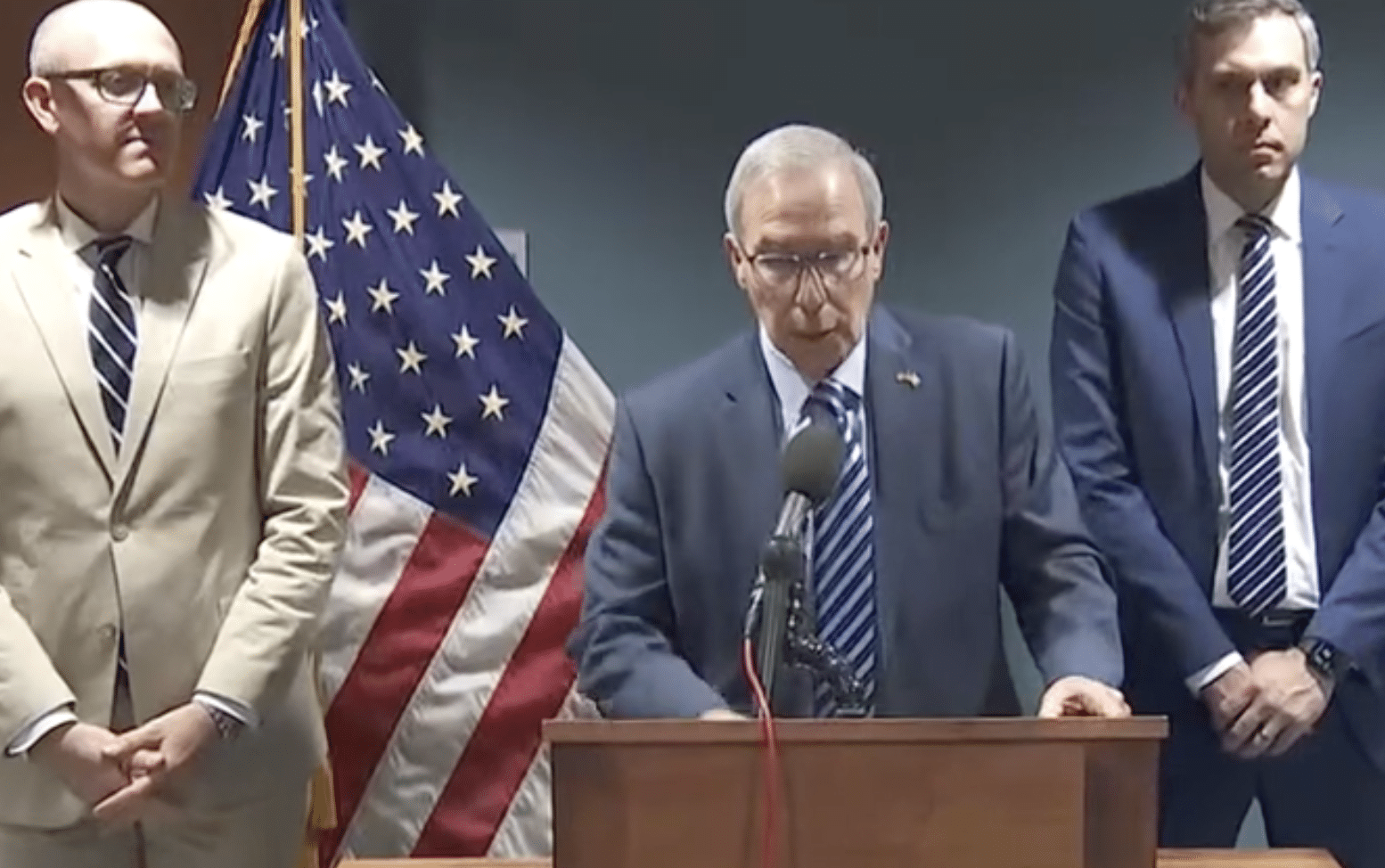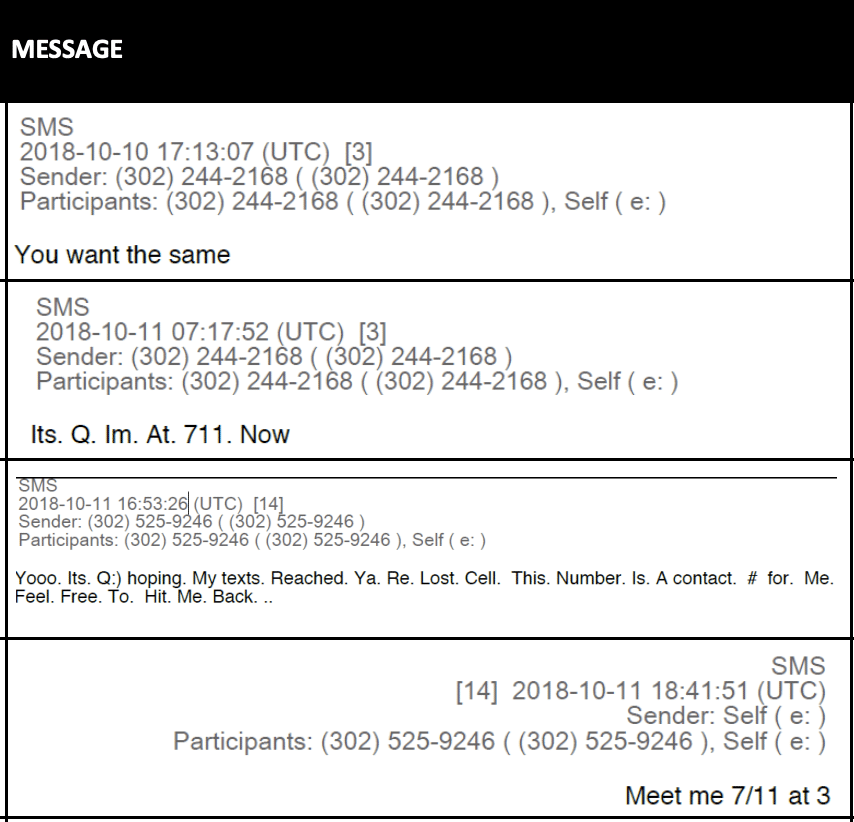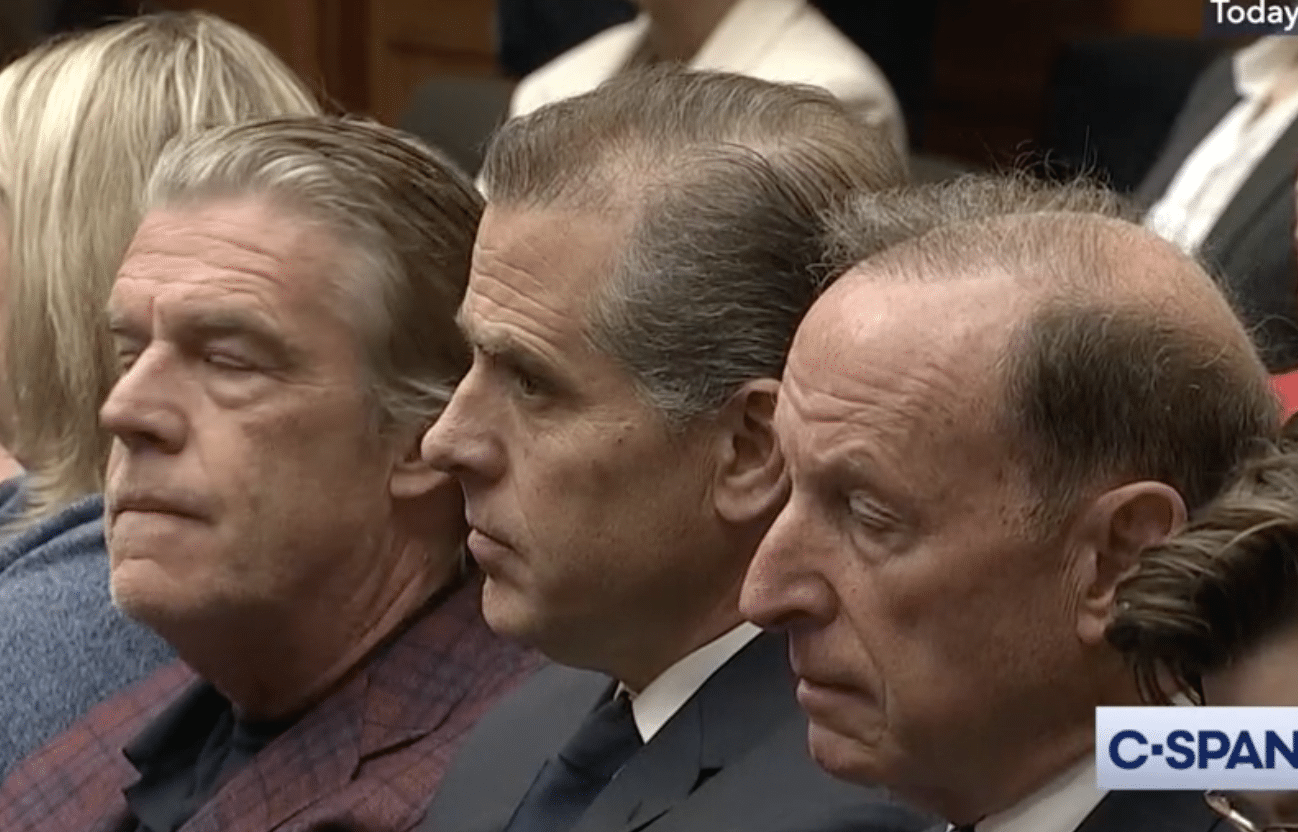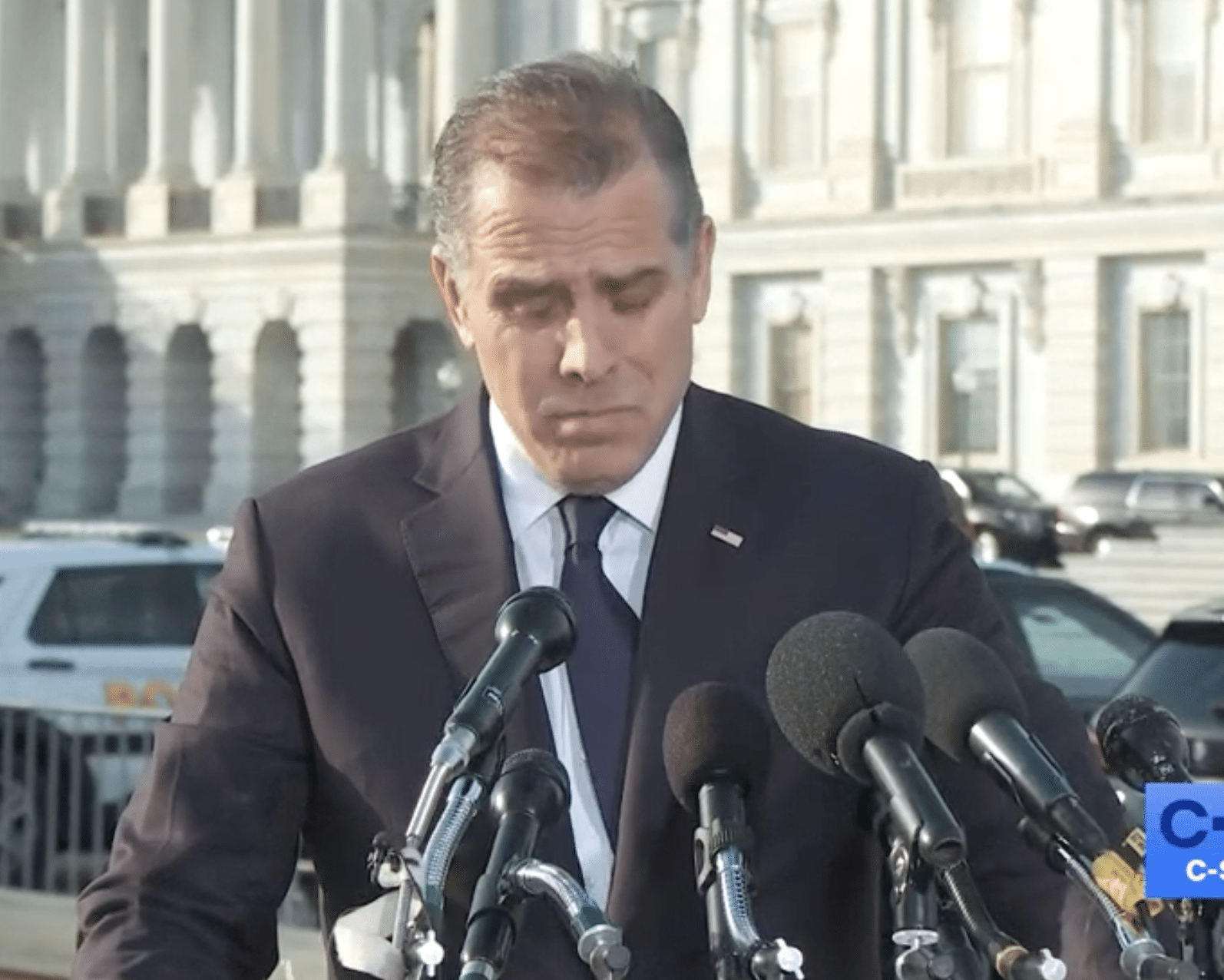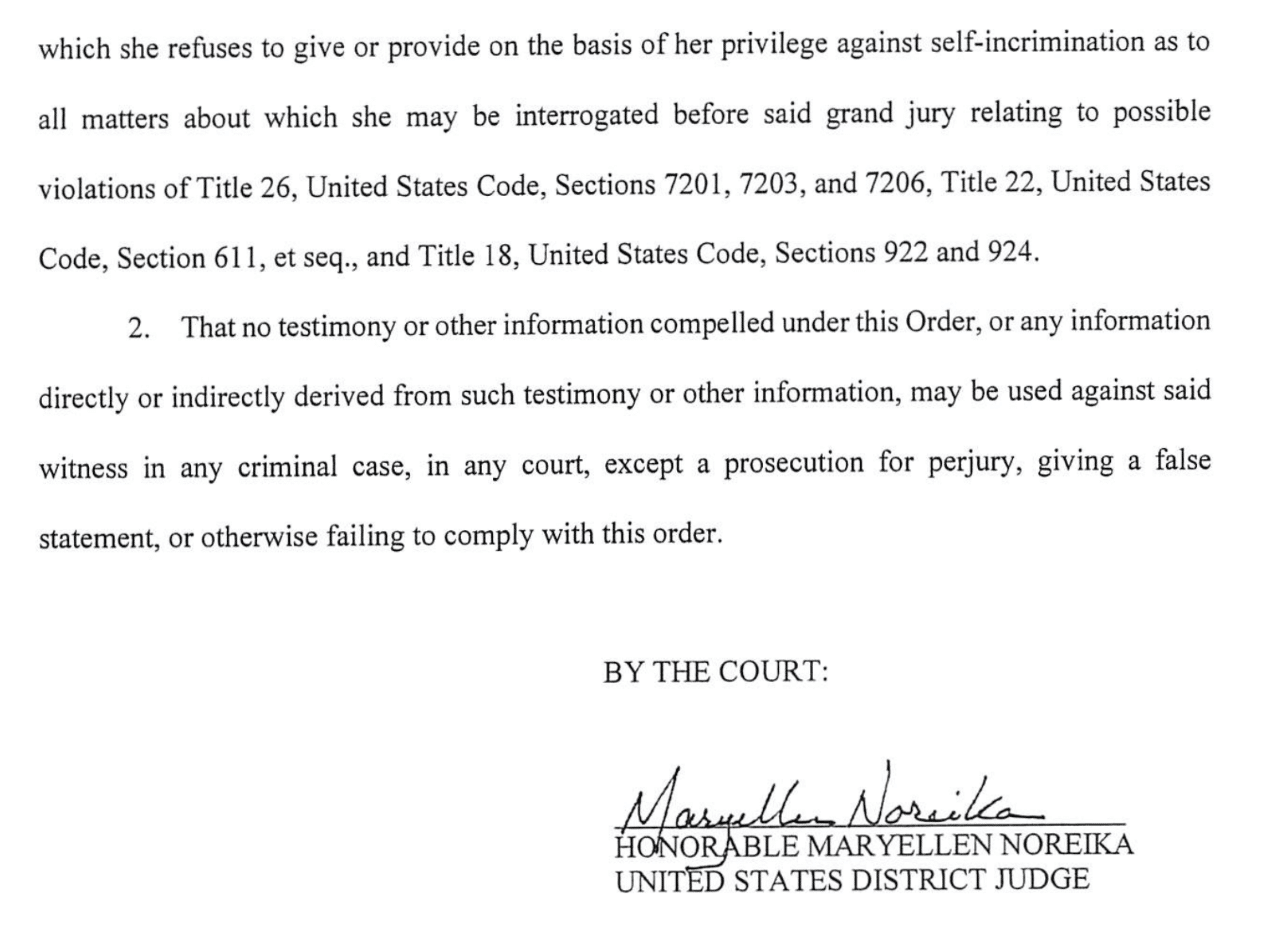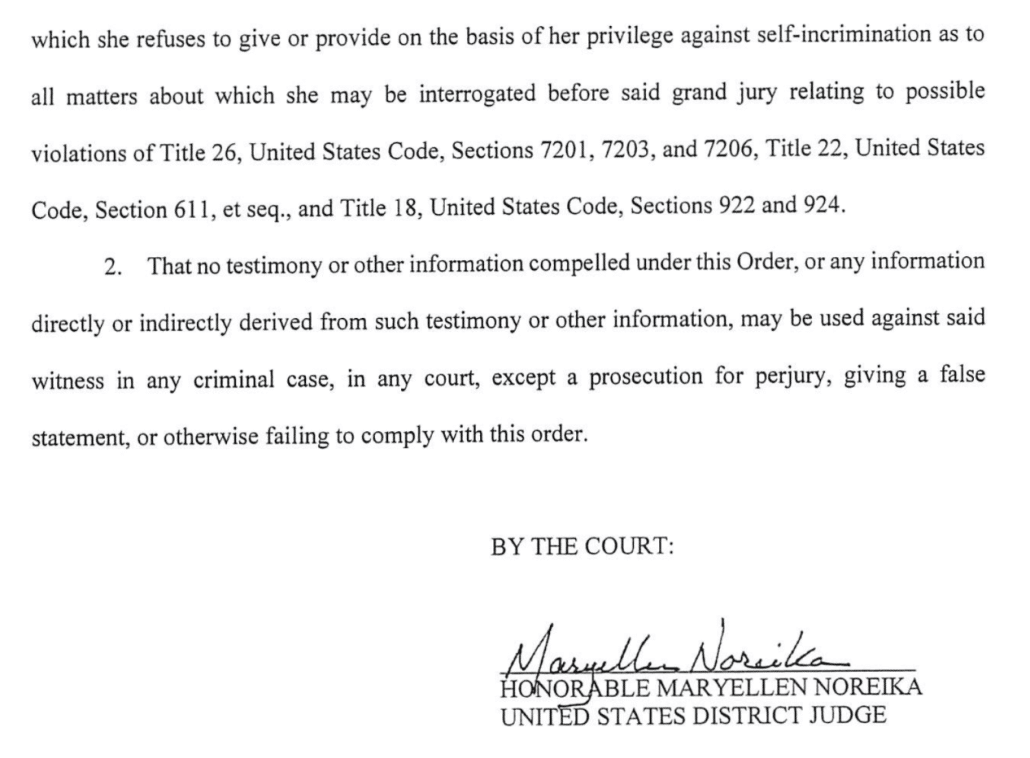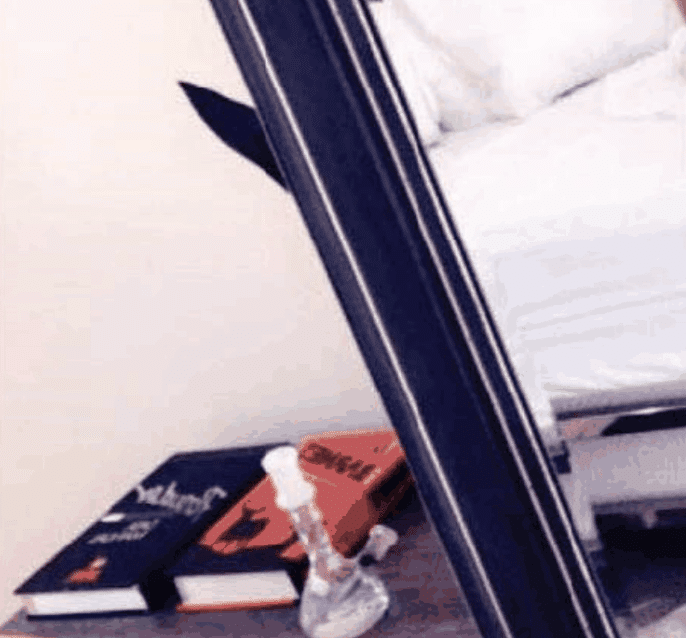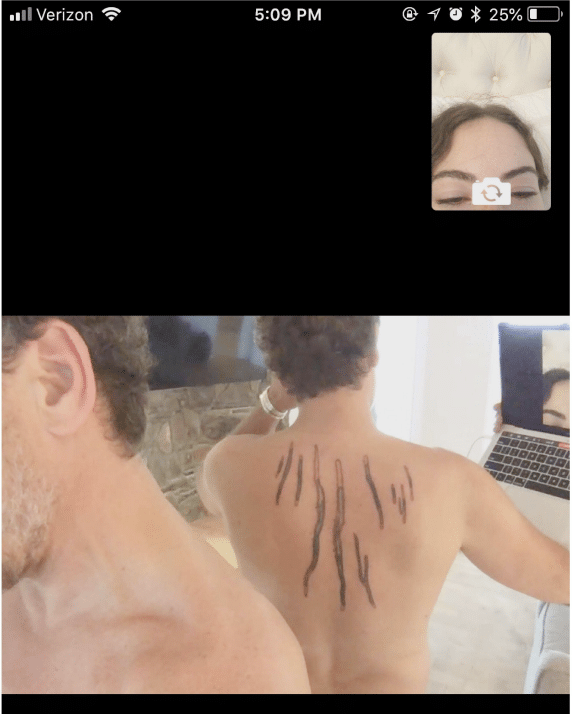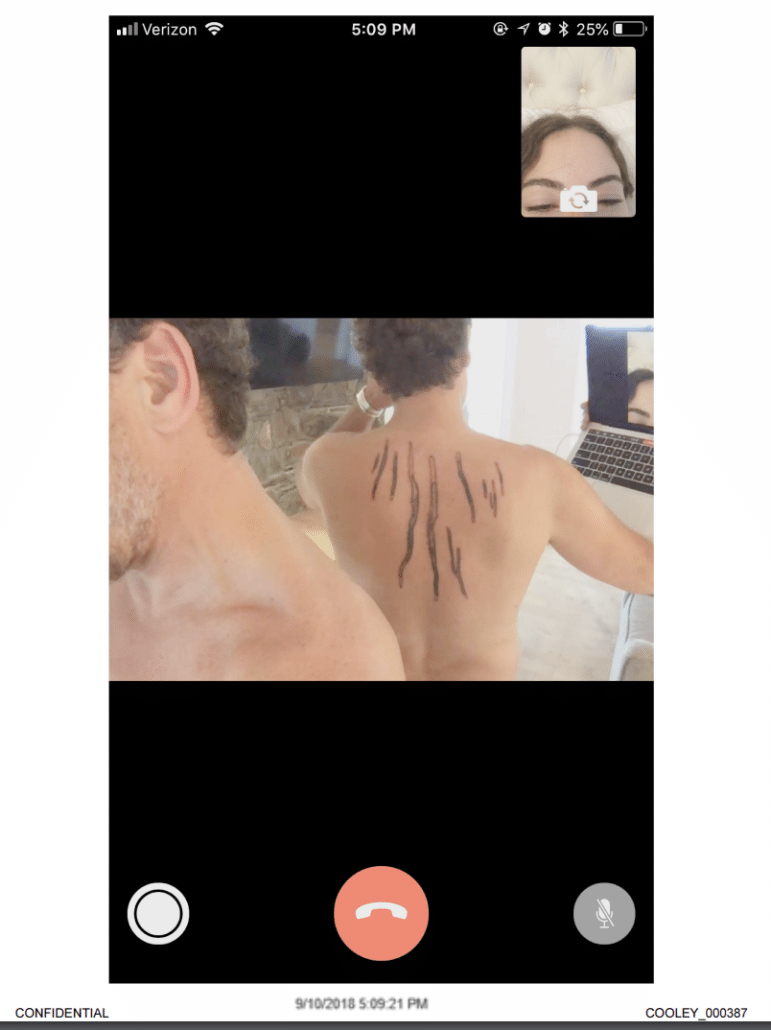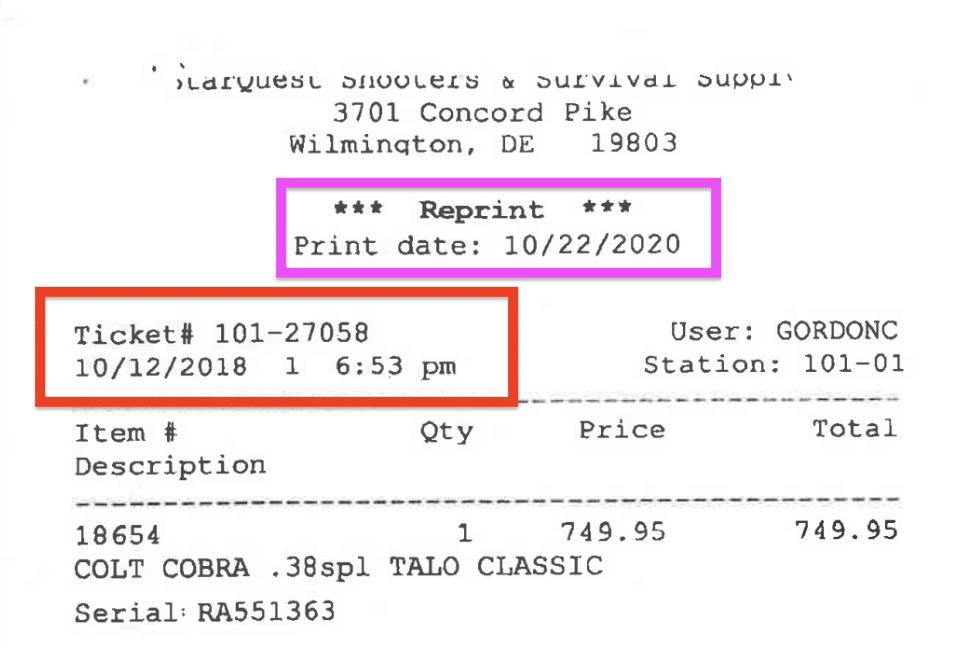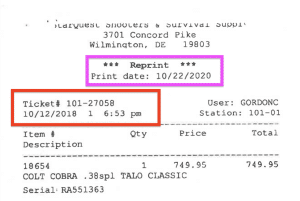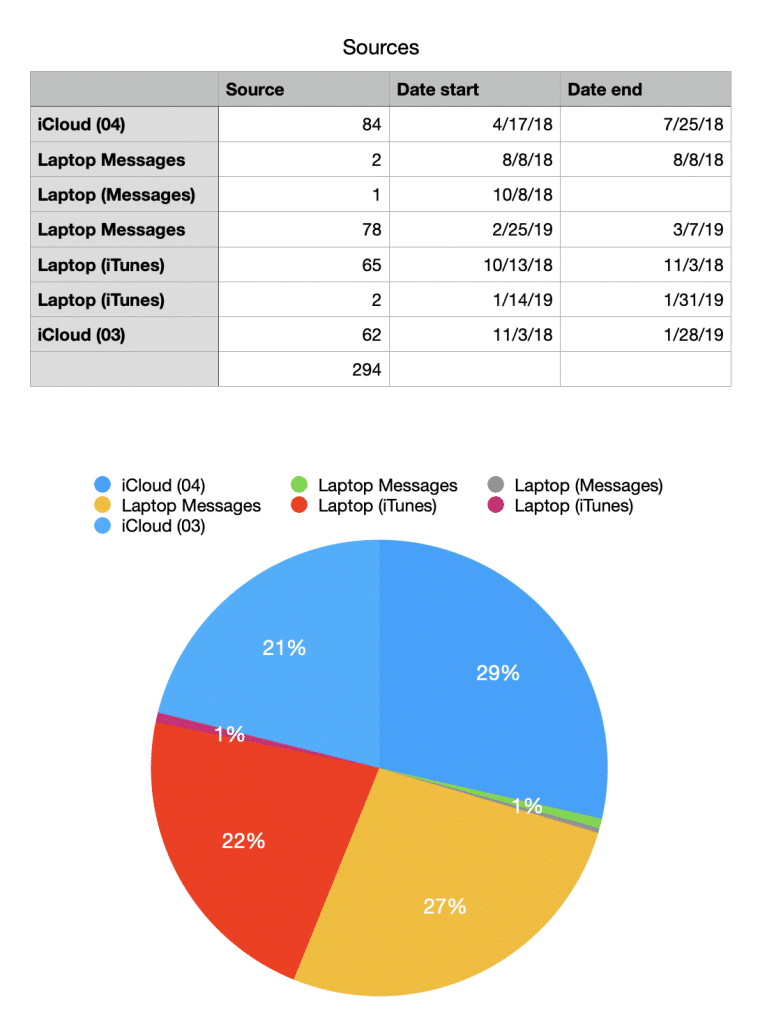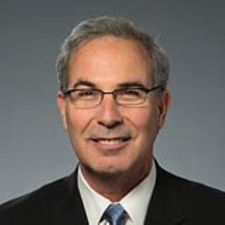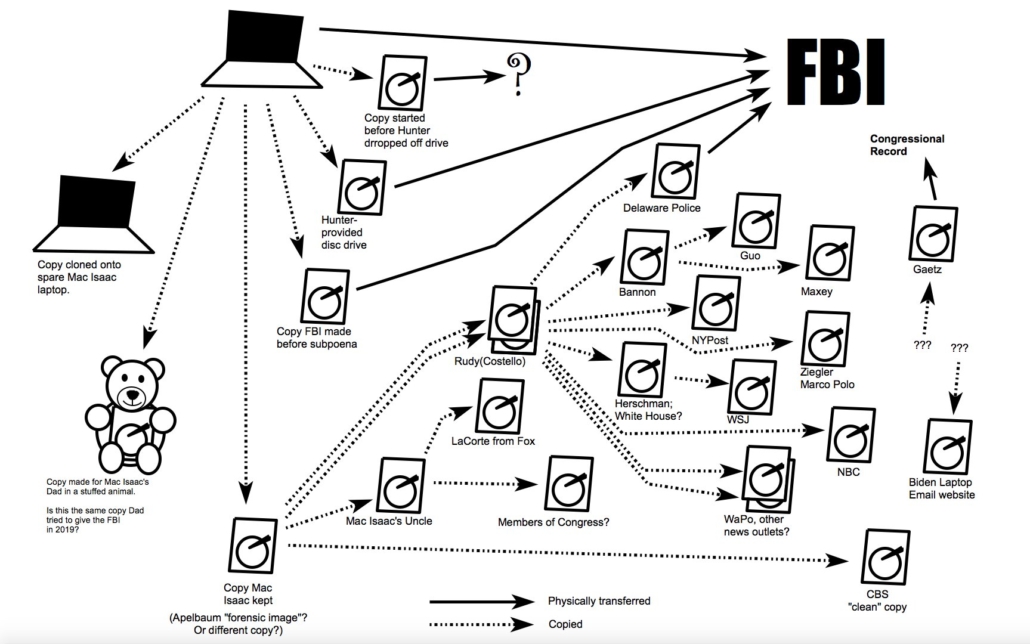While Hunter Biden’s team hasn’t officially decided whether he will take the stand, I’m confident we have seen the last witness testimony in the trial. Friday’s testimony might lead to a split verdict from the jury, with the easiest possession charge solidified, but more reason a jury might balk at the two documents charges.
But, after reading the transcript, I can’t help but view the last day as emblematic of the tragedy of the American addiction to prosecuting Hunter Biden.
Familial Tragedy
Start with Naomi Biden’s testimony.
As I’ve been saying from the start, Hallie Biden was the most important witness for prosecutors, not just because she’s the one who found and discarded of the gun at the center of the case, but because Hunter sent Hallie texts during the time he owned the gun discussing buying crack.
In addition, at trial, Hallie testified that she searched Hunter’s truck because he had come to her house overnight on October 22 and she thought he might have been using. She described finding “remnants” of crack cocaine which, given the fact that the pouch in which Hallie put the gun before disposing of it had trace remnants of cocaine, was particularly damning.
Q. When you searched his car, what did you find? Or when you cleaned out his car, to use your words, when you went through the car?
A. Aside from trash and clothes.
Q. Full of trash and clothes?
A. Yeah. I did find some remnants of crack cocaine and some paraphernalia.
Q. And just to be clear, this is the morning of the 23rd?
A. Yes. Oh, and the gun, obviously.
In real time, there was a discrepancy between Hallie’s explanation to Hunter of why she disposed of the gun — because it was not locked up — and Hunter’s — that it was locked and her disposal of it publicly made it more risky.
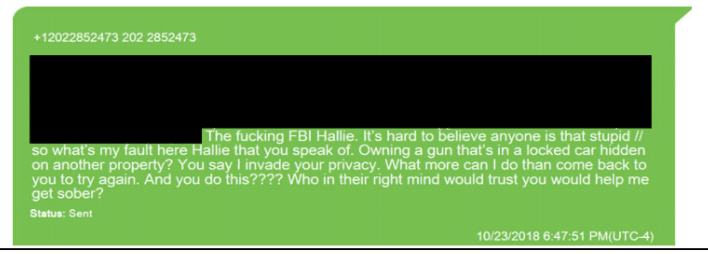
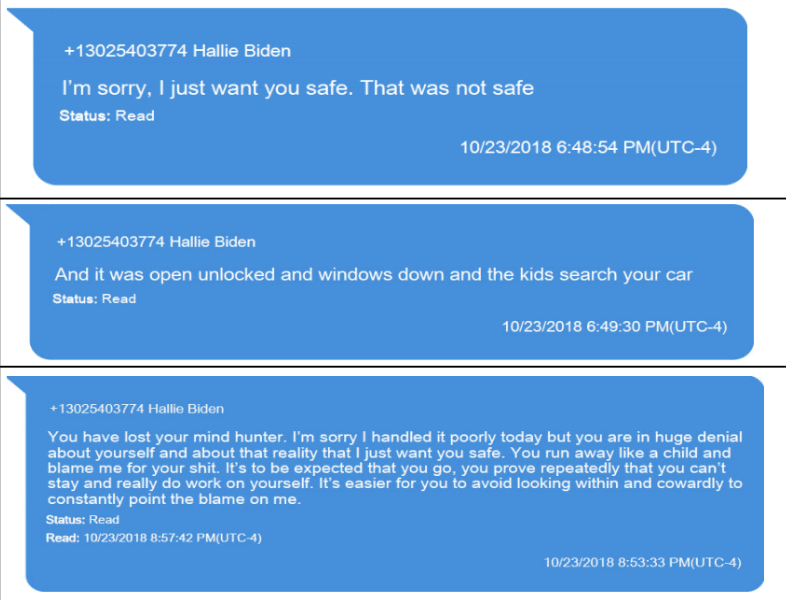
On the stand, Hallie described that the lock on the console “had been broken.”
Q. Where did you find the gun in the truck?
A. In the console, the arm console, it was like a box.
Q. Was the box part of the truck like in the —
A. Yes.
Q. Was that box locked?
A. It had a lock, but the lock had been broken. So it was like two inches ajar, you couldn’t like click it.
Hallie’s testimony on the stand — that she searched the truck because Hunter looked like he had been using — conflicted with the police report (which quoted her saying “I think he is screwing around on me”) and some of her contemporaneous texts (which Abbe Lowell struggled to get admitted under the rules of evidence).
I assume these inconsistencies were why Hunter’s team called Naomi Biden to testify. She had used the truck in which the gun was found to help move her boyfriend to New York days earlier, so she knew what it looked like when she gave it back. But rather than helping Hunter’s defense, it will end up matching the classic examples of circumstantial evidence.
You go to sleep and the ground is bare, you wake up and there’s snow on the ground, you have circumstantial evidence it snowed overnight.
Someone comes in from outside carrying a wet umbrella, you have circumstantial evidence it’s raining.
You give your dad his truck and it’s clean and the console is locked, but days later your aunt finds drug paraphernalia in it and the console guarding the gun has the lock broken?
Here’s how that testimony played out.
Q. When you took the truck from Washington D.C. to New York, what was the condition of the inside of the truck?
A. It was in good condition.
Q. By that I mean was there any laundry thrown around, any things that you could determine were left in the truck by your dad?
A. No.
Q. I want to talk about the Raptor truck a minute. Would you put up DX — can you look at Exhibit 12 in your book. So the condition of the truck is where we were at. I asked you what was inside and you said there was nothing particular left behind. When you gave the truck to your dad in New York, did you see strewn about, any, what we’ll call drug paraphernalia?
A. No.
Q. Did you see any white powder residue or anything like that?
A. No.
All the more so given the line of questioning from Leo Wise suggesting that, at a time Hunter was trying to collect the truck in the middle of the night, a drug dealer Zoe Kestan had identified, Franky, had gotten a code to access Hunter Biden’s Wells Fargo account.
Q. Did he tell you he was meeting with someone named Franky?
A. I don’t remember.
Q. Did he tell you that he had Franky come to his hotel room?
A. No. I don’t remember.
Q. I’m sorry, I didn’t hear you?
A. I don’t remember.
Q. Did he tell you he had given someone named Franky an access code to his Wells Fargo account?
A. No.
It’s clear now that prosecutors called Kestan for that testimony — that Hunter gave her and his drug dealers five minute codes to access his bank account — as much as anything else. Prosecutors have some idea who was making the cash withdrawals that, without the five minute codes, were just a proxy for drug purchases.
Not only will Naomi’s testimony provide circumstantial evidence that between the time she gave the truck back and the time Hallie searched it, Hunter had gotten and was using drugs.
But she displayed the tragedy of a family desperate to provide Hunter the love he needed to get and stay clean and instead be met with a wall of deceit. And I’m sure the Biden family is wondering, as I am, whether and if so what might have led Hunter to break the lock on his own console where he had a gun and from which two bullets were taken out of their box (but, according to Hallie, found loose in the console and disposed with the rest).
The trial as a whole has been a week-long display of unconditional love, a sharp contrast with the mob-like attack on rule of law from Trump and his supporters, a contrast that really should have been the focus of the Tiger Beat style trial coverage.
But this moment — the moment Naomi thought she might help her dad but instead may have sealed his prosecution — must have exhibited to the jury the heartbreak such unconditional love faces when supporting someone with addiction, something with which a number of jurors have first hand experience.
Hitjob Backlash
That might have sunk Hunter entirely and it still might.
But other witnesses yesterday completely discredited the testimony of Gordon Cleveland, the guy who sold Hunter the gun, the single witness to the two other counts charged, that Hunter lied on a gun form.
As I laid out here, Cleveland described that selling the gun to Hunter went this way.
- Hunter Biden picks a gun
- Cleveland hands Hunter Biden form 4473 to fill out as Hunter hands him his passport
- Cleveland leaves the front room to copy the passport which, he claims, takes less time to do than it does with a driver’s license because it is not double-sided
- Cleveland returns to the counter and watches Hunter as he fills out the gun form
- Only then does Cleveland take the passport — but not the form — in the back to ask whether he can use the passport
- He and Jason Turner return to the counter
- Turner reviews the form and sees that Hunter hasn’t signed it
- Turner then tells Hunter he needs to go get a second form of ID
- Turner goes back into the back room to run the background check
- Turner fills out the rest of the form — including dating Cleveland’s signature
- Cleveland proceeds to sell Hunter a bunch of other things, some of which he claims to have consulted on, some of which — a utility tool and a pellet gun — he claims he did not
His former colleague, Jason Turner (whom the owner of the shop blamed for altering the document after the fact, but jurors don’t know that), offered an entirely different timeline. He described:
- Cleveland puts form (which Hunter has not signed) and passport (and, Turner later claims, the gun) on stack of background checks Turner is doing
- Before doing background check, he reviews the paperwork and sees Hunter has not signed it
- Turner brings the form and passport to Cleveland and — without ever speaking to Hunter — tells Cleveland that Hunter needs to sign the form and provide a second form of ID
- Turner than stood by the back office door and watched as Cleveland got Hunter to sign the form and provide a second form of ID
- Turner runs the background check
- Turner fills out the form and in the process records the car registration (and the passport)
- Turner brings the form and the gun back out to Cleveland
- He never speaks to Hunter
- Palimere was not in the gun shop and witnesses and witnesses none of this
The shop owner, Ron Palimere (the guy who has a proffer agreement immunizing truthful testimony), offered a third story:
- At some point Palimere comes over to the store from his pawn shop because he has been informed there is a celebrity customer
- Cleveland comes back into the office with the form and the passport
- Cleveland asks if he can use just the passport for ID
- Palimere says he can
- Palimere does so because he was trying to avoid holding up the sale
The gun shop owner — the one guy with immunity — says he approved selling the gun without getting proper ID. The guy on the hook for the background check, Turner, claims he instructed Cleveland that the gun could not be sold without a second ID. And Cleveland, the guy who signed the form, says Turner interacted with Hunter and via that process got a second form of ID. Statutes of limitation have expired on the sale itself — Weiss was too busy chasing Hunter to figure out whether a still-active gun dealer has a practice of letting celebrities buy guns without proper paperwork — but they have not for any document alteration in 2020 or 2021, and if either man provably lied on the stand, they could face perjury charges.
All this might pass unnoticed to the jury. But I have to imagine they’d be surprised by Turner’s insistence that he recorded the car registration in the form, when no such thing is recorded on the form.
Q. You see the books next to it, line 18(b), right under it?
A. Correct.
Q. It says supplemental government issued documentation, if the identification document does not show current residence, government issued photo identification, do you see that?
A. Yes.
Q. If it doesn’t show residence, do you see that?
A. Correct.
Q. You a moment ago said that the passport doesn’t have somebody’s address?
A. Correct.
Q. Then you said that you told Mr. Cleveland something, right?
A. He needed to get further government issued identification with an address on it.
Q. Right. And if he did, what would you do with that?
A. I would have written it right in there.
Q. But you don’t see such writing in there, do you?
A. When I wrote that out, I wrote the car registration.
Q. You don’t see such a writing in there, do you?
A. When I wrote that out, I wrote car registration.
Q. When you wrote this out, you wrote car registration here or car registration there?
A. 18(b), car registration.
Q. You wrote it?
A. I wrote it.
Q. Where is it?
A. I wrote vehicle registration in there.
Q. I’m asking you if you did and this is the form, where is it on the form that you say you wrote?
A. It’s not there.
The conflicting stories of the gun shop employees — particularly Turner’s testimony that he ordered Cleveland to do something that Cleveland says Turner did — certainly undermines Cleveland’s credibility, and therefore his value as a witness to the way in which Hunter filled out the form.
But as I’ve described there is another element of the offense to both the form-related charges, beyond just that Hunter knowingly lied on the form. One requires that a false claim be material to the sale; in this case, the gun shop owner testified that not having proper ID was not material to this sale. The other arises from the obligations on the gun shop to keep proper paperwork, which Turner’s testimony makes clear they did not (though discussion of which remained largely barred by Judge Noreika’s order prohibiting discussion of the later alterations).
Even without knowing that the form got doctored years after the fact, jurors may have reasonable doubt about what actually happened here.
And the conflicting testimony may oblige David Weiss to do something about it, something his prosecutors have been trying to avoid.
Somewhere between three and four years ago, according to Palimere, Turner altered a form in violation of instructions that Turner acknowledged are right there on the form. The men gave irreconcilable testimony on the stand.
If you’re going to prosecute Hunter Biden for lying on a form, how do you avoid prosecuting a gun shop that doctors a form after the fact? In other words, one of these guys risks joining Alexander Smirnov in legal hot water, because the imperative to prosecute Joe Biden’s son has revealed that one after another after another after another person did something really shady to make sure he’d be prosecuted.
DEA’s Los Angeles traffic expert
All of which may lead jurors to ask what they are doing here — not least, why they have spent days of their lives seeing evidence that Hunter Biden used drugs anytime other than the days leading up to October 11 (showing his mindset when he purchased the gun) and between then and October 23 (when Hallie disposed of it), when he wrote a book admitting to just that.
Prosecutors have buried the jury with one of the few things not in contention: that Hunter Biden struggled with addiction, with periods of sobriety and periods of desperate addiction.
The absurdity of all this may have come into focus on Friday during the testimony of Joshua Romig, the DEA expert brought in to to translate for jurors topics that were not in dispute.
As Romig described, his day job is investigating drug trafficking, including “some firearm offenses when it comes to drug traffickers.” But it is the trafficking itself that DEA is trying to shut down.
I did that for over five of the years that I was assigned to the DA’s office, was just investigate drug trafficking offenses. I was very briefly assigned to the warrant unit before I got hired by DEA, because my boss didn’t want me to get involved in anymore court cases because he knew I was leaving. And then since I have been a DEA agent, the only thing, we’re a single mission agency, all we do is investigate drug trafficking. There are nuances to those drug trafficking cases, we investigate money laundering when it comes to drugs, we investigate some firearm offenses when it comes to drug traffickers, theft of firearms, but my primary responsibility is to investigate drug trafficking.
Derek Hines — he of the sawdust as cocaine — started Romig’s testimony with a focus on how the drug trade works, which led Abbe Lowell to object and this contentious sidebar.
MR. HINES: It’s not going to be a long road, I’m merely establishing if the jury understands what cocaine is and generally where it comes from to get to its source distribution points, and that forms the basis for Mr. Romig to testify about how he knows what the drugs are and how the language works in the drug trade so he can give an opinion to the messages which I seek to put up. This won’t be a long road.
MR. LOWELL: Ten feet, 2 miles, what’s the length of the road?
MR. HINES: Not as long as the roads you travel, Mr. Lowell.
Then Hines launched into a review of communications from times other than October 2018 that continued for 37 minutes.
Lowell responded by going on at length himself, noting that all the communications Romig reviewed were for times other than October 2018, and with two exceptions, there were no communications with drug references from that period, neither of which required an expert to interpret them.
Q. You see the date, these are now October of 2018; right?
A. Yes, sir.
Q. Take a look at those. All right. If you go to the next page, please. And you see those texts?
A. Yes, sir.
Q. Okay. Now, you see on the 13th, go back one, please, Mr. Radic. Now go forward one, and go forward one. Okay. Look at those texts. Go forward one. Go forward one. That’s still in October of ’18. Please go forward one. Would you go another one? Do you see a reference to a Bernard at 10:13; right?
A. Yes. 119.
Q. Do you see that one?
A. I do.
Q. You didn’t do any independent investigation of who Bernard is or whether he even exists did you?
A. No, I didn’t do any investigation in this case.
Q. Got it.
A. I just was provided the messages that you see in front of you.
Q. And no need to interpret, because there is a word dealer there, so you didn’t need to interpret that one?
A. A lot of these messages don’t need much interpretation for me, correct.
Q. Go to the next one. That’s to Rows 125. Please go one more, please. I’m sorry, go back, you saw there is a reference in that to sleeping on a car, smoking crack, you don’t need to interpret that?
A. I don’t think I need to interpret that, no, sir.
Q. You don’t know whether that’s accurate or not, whether that’s where he was at the time; right? A. I don’t.
Q. Next one. Look at those. Next one, please, Mr. Radic. And again, we’re in October of 2018, right?
A. Correct.
Q. If you go to the next one, take a look at those. Like, for example, 1:35 on the 16th of October is one that says “hey buddy, it’s Richie Jones, checking in”, that’s no reference to drugs or anything like that, right?
A. It doesn’t appear to be, no.
Q. Go to the next one, Mr. Radic. With that. Go to one more, please. Okay. We’re in the end of October 2018. Go to one more. 1:49. And we’re still in October. Right? And then the next one. Do you see that’s at the going into November and after, do you see that?
A. Yes, sir.
Q. When you reviewed this chart before you came to court or at any point in your investigation, in what I just showed you from the period of time from August of 2018 through November of ’18, there is no reference in what you saw or analyzed of 1.4, is there, in those texts that I just went through with you?
A. No, I’m not sure when that 1.4 text was, but no, not in the ones we just reviewed.
Q. No reference or photo of any scale with white rocks on it in the texts I identified for you between August and November of 2018; correct?
A. Correct.
Q. No reference to baby powder in that period of time?
A. Correct.
Q. No reference to soft stuff in that period of time?
A. Correct.
Q. No reference to party favor in that period of time?
A. Correct. Q. No reference to grams in that period of time?
A. Correct.
Q. No reference to chore boy in that period of time?
A. That’s correct.
Q. No reference to one full in that period of time?
A. Correct.
Q. No reference to fentan in that period of time?
A. Yes. Correct.
Q. And no reference of a ball in that period of time?
A. Correct.
Q. Those last 4 or 5 were all the way into 2019 as we went through on the screen a moment ago, right?
A. Yes, sir.
Q. And in that period of time, there is no pictures of a drug being used, right, no holding of a pipe, right?
A. None that I reviewed.
Q. No bags on a scale, right?
A. No, sir.
Q. No bags at all?
A. Correct.
Q. No videos of him weighing any drugs, right?
A. None that I reviewed, no.
Q. So all that you identified and what I went through with you, were for the years I said before and after the period of August of 2018 through the time that we identified those in November of ’18, that would be a fair statement I just made, isn’t it?
A. With the exception of the October text that we talked about, where he said he was smoking crack.
Q. I did those too. We identified those too. You’ll agree with me, no pictures, no photos, no scales, no white rocks, no chore boy, no fentan, no ball, no ounce, no grams, none of that?
A. Yes, sir, outside those two messages, you are correct.
Romig did describe that the size of cash withdrawals Hunter was making were consistent with drug use, but admitted he didn’t do any analysis of Hunter’s cash flow at the time.
And it’s not just the fact that Derek Hines (he of the sawdust as cocaine) asked this DEA expert to spend his time analyzing comms from periods other than October 2018. More importantly (as Lowell elicited), the DEA doesn’t spend its time reviewing the comms of end users, because the goal is to break up large scale drug trafficking.
Q. In your introducing your expertise and what you are testifying about, you indicated that your job and the job of your colleagues is to be trying to break up large scale distribution of drugs?
A. Correct.
Q. Usually not individual users?
A. That’s correct.
Q. And you don’t have any reason to understand that what Mr. Biden is on trial for has anything to do with him being a distributor?
A. Nothing that I have reviewed would indicate that.
Q. And you’re not investigating, or you didn’t investigate him for the time he was using?
A. I have never done that, no.
Q. You went over all those texts that had people’s names and numbers, some of which you just went over with Mr. Hines, and there were people that seemed to be the distributors, or at least the people that were selling him narcotics. Did you see those people’s texts?
A. Yes, sir.
Q. So as your job to try to break up large scale distribution, did you look into those people?
[snip]
Q. My question was, you didn’t do that, not that you don’t know that it was done, not withstanding that you said your goal —
A. The DEA, as far as I know, but specifically me, or any of the groups that I supervise did not investigate any of the people based on my review of the sellers in this investigation.
Derek Hines’ DEA witness made it clear that this was not an effort to combat drug trafficking. Nor was it an effort to analyze even primarily the communications Hunter sent during the period he owned a gun.
This testimony put the issue of priorities before the jury.
As Manuel Estrada described when explaining to HJC why his top aides advised against getting involved in this case, there are — there should be — far higher priorities.
A Just around that. I mean, just to put it into perspective, it was a crisis mode when I came in because one of the major areas we have is national security. National Security covers not just foreign actors. It includes terrorist actors. It includes domestic extremism. And I’ve had to double the size of that division during the time I’ve been there, and we still can’t handle all of the cases we have there. Q And that’s today, even doubled, you don’t have sufficient attorneys to handle all of the cases? A Well, that’s true in every one of our areas. We don’t have enough AUSAs to handle our national security matters. We could be doing every AUSA in my office could be doing PPP fraud cases we have so much PPP fraud. Every Q PPP is the
A That’s the COVID fraud, COVID19 money fraud. Every AUSA in my office could be doing healthcare fraud cases we have so much healthcare fraud. We have to deploy our resources in the most effective manner to address the needs of the district. As I mentioned, we have a fentanyl epidemic. That includes not just deathresulting cases, it includes going after cartels which are distributing these pills, not just in powder form but in pill form. We routinely seize over a million pills at a time from vehicles, and we need to prosecute those cases. Each pill could be a death. And routinely now we’re finding cartels transporting fentanyl in liquid form, which is a new thing that they’re doing. So we have to do those cases.
We have a violent crime crisis where, for a variety of reasons, including some of the local policies, there has been an increase, certainly in our view, of violent crime and use of handguns in crimes. We have taco vendors on the streets getting robbed at gunpoint. So we are doing more of those types of offenses than we ever have before. We don’t have enough resources to do those.
But David Weiss reneged on a plea deal to chase a hoax from someone with ties to Russian intelligence and since then has been throwing everything he had — including this DEA expert’s time — reading texts from Hunter Biden from periods not remotely close to the period he owned a gun.
Judge Noreika has, properly, been working hard to guard against the jury nullifying this vote, voting that this whole thing is just so stupid and such a waste of time.
But Jeebus: with the human tragedy and the increasing consequences for those who campaigned to target Hunter Biden, what the fuck is the point. What are we doing such that the most important legal case in America serves primarily to subject Joe Biden’s family to the tragedy of his son’s addiction all over again?

